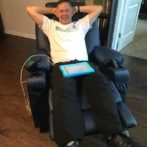Snapshots of Dementia: Not My Problem?
Photograph © Dennis Minty, 2022. When my mom and I took our recent cruise, I left my caregiving responsibilities behind—but as I wrote last week, they didn’t leave me. And guess what? Dementia didn’t leave me either—even when it wasn’t my problem. On our first expedition day when we left the ship to visit Sable Island, Mom decided to stay behind. We left the ship according to color groups, so when the leaders called ours, I headed to the mud room—where we prepared to disembark—without her. As I pulled on my waterproof pants, rubber boots, and other equipment, I noticed a woman I’d seen when Mom and I were having our boots sized. We’d introduced ourselves, and I remembered her name. Today, she was visibly upset. “I don’t have a backpack,” she said. “My shoes will get all wet.” On the trip necessities list was a backpack (and dry bag to hold it) to carry hiking shoes, phones, and anything else we needed for off-ship excursions. I’d already planned to carry Mom’s equipment in my bag. “I can take your shoes,” I told the woman. “I have extra room.” She seemed overjoyed. “Oh, thank you! Thank you so much!” she told me as I stuffed her shoes into my pack. She disappeared after that, but I knew I’d find her on the island. I didn’t think she’d attempt a hike in her rubber boots. For the next few minutes, I finished preparing, then followed the procedure we’d learned for safely seating ourselves on the zodiac. Despite some fog, we had a fairly smooth ride and landed on the island with the help of our “spinners,” who turned the zodiac and pulled it onto the beach. Next, I headed for the area where we could change into our hiking boots. I didn’t have a hard time finding my new friend—not because she was looking for me, but because she was looking for her shoes. “I can’t find my hiking shoes,” I heard her tell someone else. “I don’t know what happened to them!” “I have your shoes!” I said, pulling them out of my pack. Once again, she was overjoyed—momentarily. She didn’t say, “Oh, that’s right!” or “Of course!” She just accepted the shoes and moved on. And I wondered. From then on, I kept noticing this woman (I’ll call her L). Although L had an extensive vocabulary and could carry on an interesting conversation, every time I encountered her, she seemed a step behind. Once, she showed up with our color group on a tour segment—but she belonged in another. I saw others shaking their heads at her evident confusion. And I wondered. Another day, I was...
Read More








